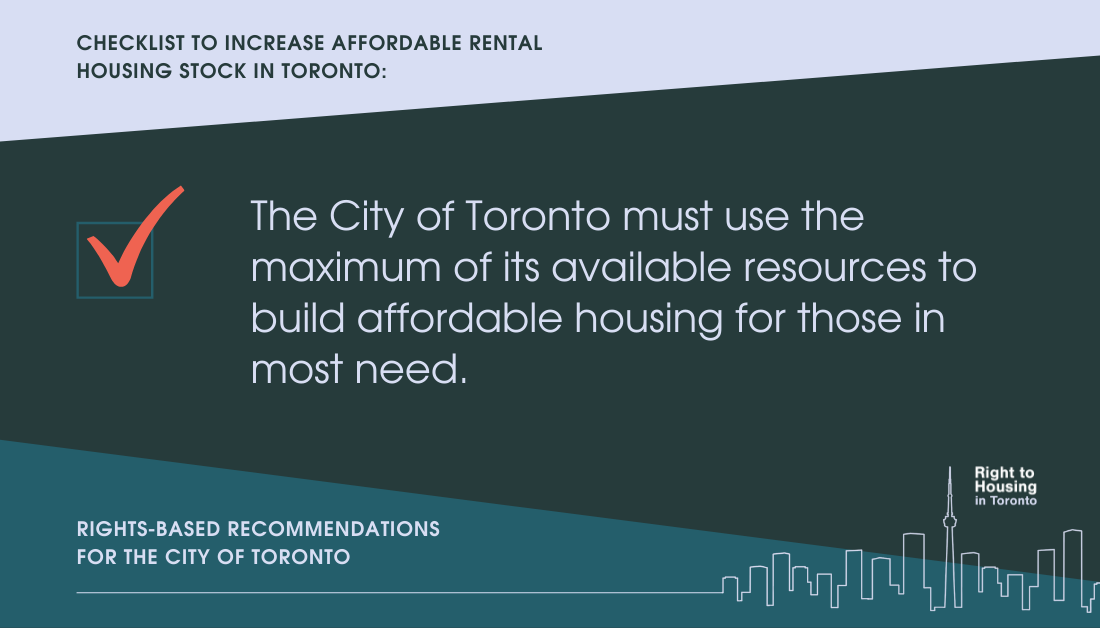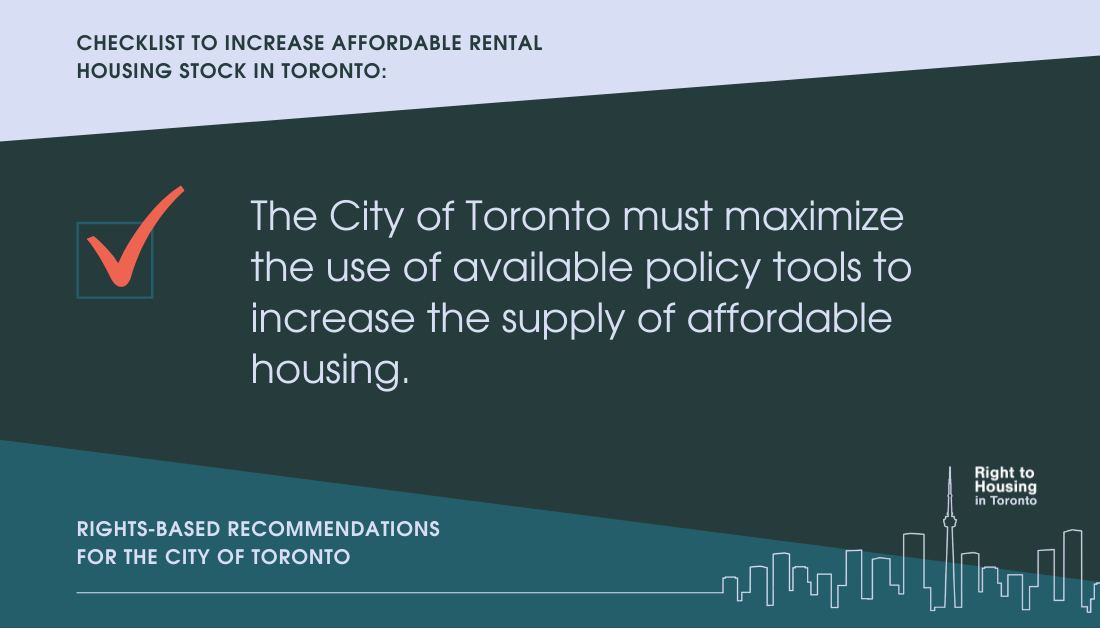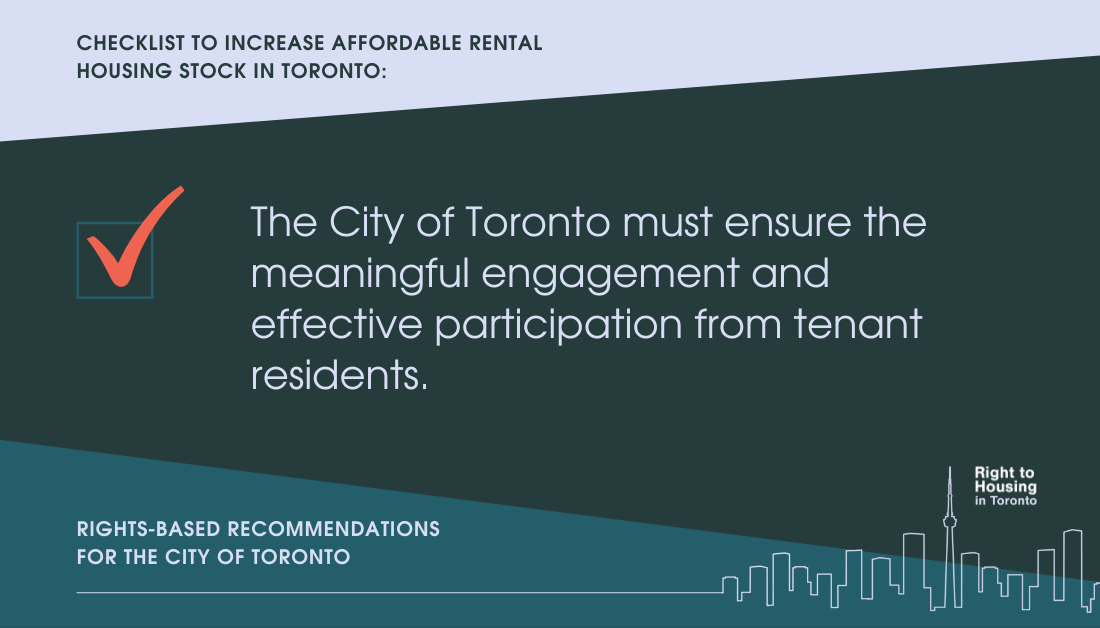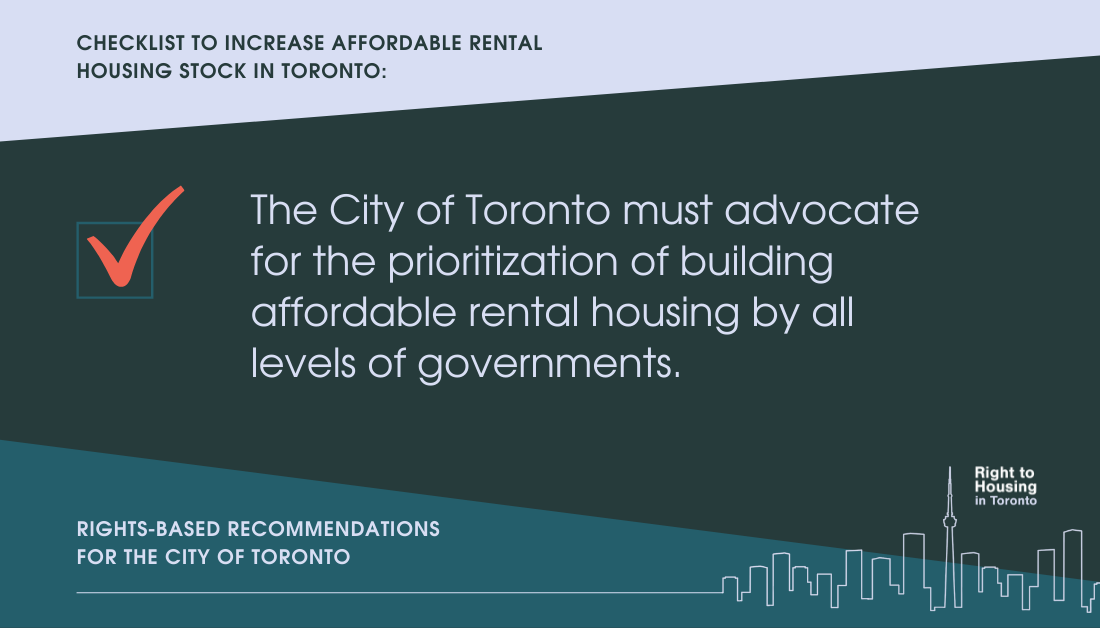February 28, 2022
The following key recommendations for the City of Toronto from our report on Increasing Affordable Rental Housing Stock are based on the right to housing and human rights principles. They aim to to guide the City’s policies to ensure low- to moderate-income Torontonians can access affordable places to call home.
We invite advocates, groups and organizations to incorporate these recommendations into their own reports, policy proposals and submissions, calls to action, and meetings with elected officials and City staff.
Read:
- Our Recommendations (below)
- Full Report – February 2022
- Follow-up report – May 2023
Our recommendations to increase affordable rental housing stock in Toronto
1. Use maximum available resources to build affordable housing for those in most need.
Principle 1: The City must use all available revenue tools and assets to act with urgency to build affordable housing for low- to moderate-income renter households.
Recommendations for the City of Toronto:
- Explore a wider set of revenue raising tools dedicated specifically for affordable housing.
- Further leverage existing assets such as public lands and properties to increase deeply affordable housing options.
- Ensure CreateTO programs consider and respond to the challenges faced by non-profit housing developers in order to promote the growth of non-profit affordable housing developments.
- Expand efforts to integrate affordable housing needs in as many initiatives involving public lands and redevelopment and use of public properties.
- Provide support for organizations working with marginalized communities in need of affordable housing to access federal and provincial programs.
↓ Download and share this graphic

2. Maximize the use of available policy tools to increase the supply of affordable housing.
Principle 2: The City should consider and explore all policy and zoning options to increase the supply of affordable and deeply affordable rental housing stock.
Recommendations for the City of Toronto:
- Prioritize development incentives such as expedited approval processes towards building affordable rental and deeply affordable housing options.
- Expand exemptions of development charges for non-profit housing providers that are not registered as charities.
- Encourage redevelopment of vacant commercial buildings into residential use, with prioritization for affordable housing.
- Make the inclusionary zoning program more robust.
- Continue to leverage zoning to promote more density in a balanced form that retains affordability and promotes complete neighbourhoods.
- Continue to explore architectural innovations such as modular housing to cost effectively and rapidly deliver on new deeply affordable housing initiatives.
- Adjust the application process of the Open Door Program to better address the needs of non-profit housing providers and to better facilitate their participation in the program.
↓ Download and share this graphic

3. Ensure meaningful engagement and effective participation from tenant residents.
Principle 3: The City must engage with impacted communities and those opposing affordable housing developments to build cohesive neighbourhoods rooted in shared understanding of the benefits of inclusive communities.
Recommendations for the City of Toronto:
- Encourage communities impacted by the housing affordability crisis to engage in civic action to have their voices heard.
- Provide creative consultative opportunities for lower income households to be involved in the policy decision-making processes.
- Develop engagement strategies within neighbourhoods that encourage inclusive community building.
- Develop a robust engagement plan with communities across Toronto to promote the benefits of zoning changes and respond to misinformation campaigns by highlighting benefits of mixed-income neighbourhoods.
- Work with the Ontario Human Rights Commission, civil society organizations and specialty legal clinics to counter opposition to affordable housing developments.
↓ Download and share this graphic

4. Advocate for the prioritization of building affordable rental housing by all levels of governments.
Principle 4: The City must leverage all available avenues to encourage cooperation with different levels of government to build affordable rental housing stock.
Recommendations for the City of Toronto:
- Continue to engage with the Provincial government to increase funding for affordable rental housing projects.
- Make full use of avenues – public and private – to advocate for provincial housing and land use laws and regulations that enable the City to deliver on its housing mandate as opposed to restricting it.
- Advocate for increased federal investments to fund the creation of deeply affordable rental housing options that meet the needs of lower income Torontonians.
↓ Download and share this graphic

